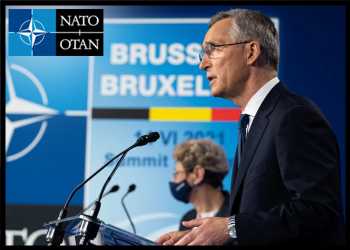
NATO Summit Warns Of China’s Military Threat; Agrees On Dual-track Approach To Russia
The NATO Summit in Brussels warned of the military threat posed by China, and reaffirmed the Alliance’s dual-track approach of defense and dialogue towards Russia.
Leaders of 30 European and North American countries who convened at NATO Headquarters Monday took important decisions to chart the Alliance’s course over the next decade and beyond.
They called on China to uphold its international commitments and to act responsibly in the international system. They agreed on the need to address the challenges posed by China’s growing influence and international policies, and to engage with China to defend NATO’s security interests.
China responded to the NATO communiqué by saying that its pursuit of defense and military modernization is “justified, reasonable, open and transparent.”
However, NATO Secretary General Jens Stoltenberg stressed that the alliance does not prefer engaging in a new Cold War with China.
On Russia also, the military alliance made it clear that it did not want a confrontation with the super power.
Leading off the discussion, US President Joe Biden said that in his upcoming meeting Wednesday with Russian President Vladimir Putin, he will convey to him that he is not looking for conflict with Russia.
However, after the summit, he told reporters, “The Alliance will respond if Russia continues its harmful activities and we will not fail to defend the Transatlantic Alliance or stand up for democratic values.”
The Alliance adopted a far-reaching plan to make sure that NATO can meet the challenges it faces today and in the future.
The last time NATO put together a strategic plan was in 2010, when Russia was considered a partner and China wasn’t even mentioned.
But now, the leaders have agreed to do more to enhance the resilience of the member nations’ critical infrastructure around the world, including trusted telecommunications providers, supply chains, and energy networks.
The summit endorsed a new cyber defense policy — NATO’s first in the past seven years — to improve the collective ability to defend against counter threats from state and nonstate actors against its networks and our critical infrastructure.
It also adopted a Climate Security Action Plan.
On the margins of the NATO Summit, Biden met with the leaders of three Baltic countries – Latvia, Lithuania, and Estonia – to discuss and coordinate with them in advance of his meeting with Putin on Wednesday to talk about the threat that Russia poses to NATO’s eastern flank.
Biden told them that the United States seeks a stable and constructive relationship with Russia, but will also respond in the face of Russia’s harmful activities and will always stand up for NATO Allies.
Source: Read Full Article